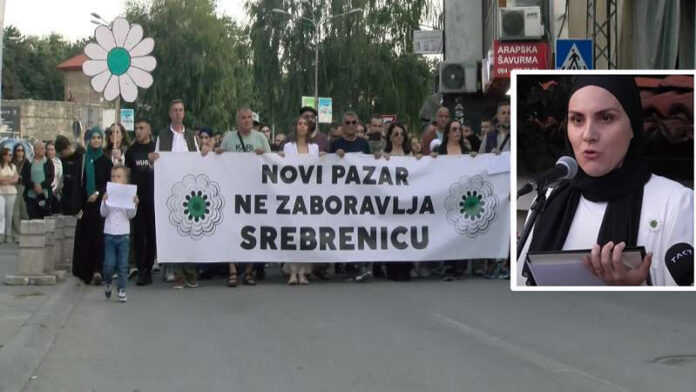On 11 July 2025 – 30th anniversary of the massacre in Srebrenica – a memory walk and protest took place in the southwestern Serbian city of Novi Pazar, located in a region bearing two names – Raška to Serbs and Sandžak to its primarily Muslim residents also known as Bosniaks since the Yugoslav wars of the 1990s [1]. On this occasion, a groundbreaking speech by a young woman echoed across the central square, leaving a ripple effect across Serbia and beyond. The region’s dual name reflects its deeply woven, multi-ethnic past: Sandžak, derived from the Ottoman administrative unit “sanjak” (meaning “district”), nods to centuries of Ottoman rule and Muslim presence; while Raška, tied to the medieval Serbian state, resonates with Orthodox Christian heritage.
This layered identity remains symbolic of the broader complexities facing Serbia and the Western Balkans today – especially the historical tensions between different ethnic and religious groups. Novi Pazar, the administrative centre of the Sandžak region, is predominantly Bosniak, and the surrounding municipalities host a mix of Serbs, Bosniaks, Albanians, Montenegrins, and Roma, part of Serbia’s 21 officially recognized ethnic groups.
Many are already calling this a historic moment. Nusreta Brunčević, a young female activist and representative of the Association of citizens of Novi Pazar, addressed a crowd of over a thousand and delivered a speech that resonated with piercing clarity and moral conviction.[2]
The gathering commemorated both the victims of the 1995 Srebrenica genocide and the more recent casualties of grand corruption in Serbia. The latter refers to the collapse of the reconstructed Novi Sad railway station canopy on 1 November 2024, which claimed 16 lives and severely injured one – a disaster widely attributed to alleged corruption and negligence within the ruling coalition all the way to the cabinet of Serbia’s President[3] – the same group that shared power in Serbia during the 1990s. This incident ignited a wave of student-led protests across Serbia, counting nine months and still.
These modern-day victims include peaceful demonstrators who have been imprisoned and beaten for demanding justice, rule of law, freedom, equality, and fair elections. Serbian citizens are organizing themselves in ad hoc associations at the levels of local communities, in an attempt to replace the non-functioning and non-representative institutions, and in an act, in their own words, of self-defence.[4]
Brunčević did not mince her words. She stated that the current régime in Serbia “participated in the ethnic killing of a nation”. “This government not only denies genocide,” she said, “it calls its own people genocidal. Serbs are not a genocidal people – genocidal individuals are convicted war criminals and their supporters. One of those supporters and deniers of genocide holds the title of honorary citizen of our city [referring to President Aleksandar Vučić], which we do not recognize, and never gave in our name.”
Never before has such a powerful gathering emerged from Novi Pazar. The speech marked what felt like a spiritual, mental, and physical act of liberation, including women’s, for the region’s Bosniak community – echoing the spirit of student-led protests that have swept Serbia over the past eight months. These protests are steadily forging solidarity across Serbia’s 21 officially recognized ethnic groups.
The Bosniaks of Sandžak have their own particular reasons not to trust Serbian President Vučić, who in the heat of nationalist zeal as a young MP of the Serbian Radical Party in the national Parliament on 20 July 1995 and with the war raging in neighbouring Bosnia stated “for every killed Serb we are going to kill 100 Muslims”, echoing the Nazi policies in occupied Yugoslavia in WWII[5].
Earlier this year, Sead Biberović of the NGO Urban In called the protests “a historic moment” for Novi Pazar. “For the first time in decades, members of the majority Serb population and minority groups including Bosniaks and Albanians are demonstrating together, united in fighting for a “poor, suffering country.”[6]
In this shared space of memory and protest, Sandžak, with its double name and many-layered history, becomes not just a geographic crossroads – but a metaphor for coexistence, recognition, and transformation.
Protesters agree: there is no turning back. Serbia’s path to overcoming the dark legacy of the 1990s may very well run through Sandžak-Raška – and certainly through Novi Pazar. Though the region bears two names depending on whom you ask, its message is singular: liberation begins with truth, unity, and unwavering demands for dignity.
As the region continues to grapple with the legacy of the 1990s, the protests in Novi Pazar stand as a beacon of hope. They remind the world that peace, dignity, and civic courage must be constantly nurtured—and that democracy can sometimes begin in the places you least expect.
[1] Bosniaks is an ethno-religious term distinct from Bosnians, being citizens of Bosnia-Herzegovina.
[2] https://nova.rs/vesti/drustvo/nusreta-iz-novog-pazara-odrzala-govor-o-srebrenici-koji-mora-da-cuje-cela-srbija-srbi-nisu-genocidan-narod-vlasti-nisu-samo-sake-krvave-vec-ruke-do-lakata/
[3] https://vreme.com/en/vesti/nova-ekonomija-kako-je-vucicev-sef-kabineta-ivica-kojic-koordinirao-aktivnosti-na-zeleznici/
[4] https://n1info.rs/vesti/akademik-vukosavic-peticija-u-sanu-za-ostavku-vucica-je-akt-samoodbrane/
[5] https://www.youtube.com/watch?v=UGqv9CJbd3U
[6] https://n1info.rs/vesti/biberovic-istorijski-trenutak-za-novi-pazar-posle-vise-decenija-srbi-i-bosnjaci-zajedno-se-bore-za-ovu-zemlju/


